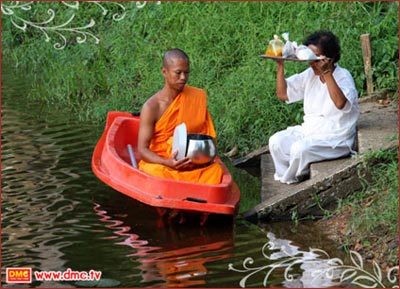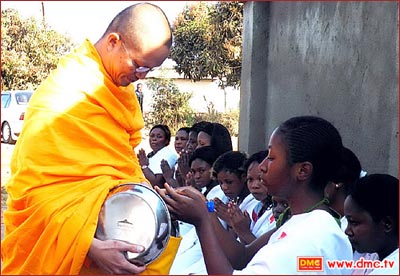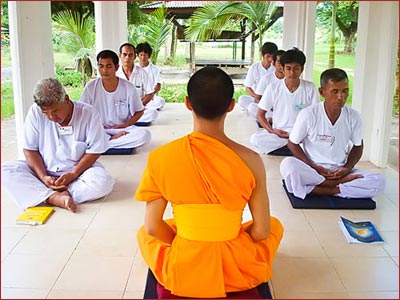Meditation for Beginners
6. The Relationship between Spiritual Mentor &Devotee
Encourage them to establish themselves in virtue
The sixth and final important factor influencing social development is the quality of the relationship between clergy and their congregations. The quality of this relationship is measured in terms of fulfillment of reciprocal responsibilities- duties collectively referred to as the ‘zenith’ [uparimadisa]. We have an intimate relationship with the social grouping to the zenith through their ability to exemplify, teach and discern virtue for us. This group consists of clergy namely monks in Buddhism, or priests, pastors or minister for other religions. We hold them in respect, because they maintain their status through their high level of virtue
A Congregation’s responsibilities to their clergy
A congregation member can express their sense of responsibility towards member of the clergy by;
1. Kindly acts: the congregation should treat the clergy kindly rather than finding fault with them;
2. Kindly words: those with an exclusively spiritual aim in life have a way of life very different from laypeople. Their aim in life is to bring illumination to the world without expecting any material remuneration. Therefore such people are rare and deserve special consideration to be spoken to in a kindly way;
3. Kindly thoughts;
finding the highest happiness in their lives.
4. By keeping an open house to them;
5. Supplying them with their material needs: In other words it is the duty of every congregation member to perform acts of generosity towards the clerical or monastic community. The Buddha laid down the rule that monks must earn their livelihood by alms alone. Monks are not allowed to earn income by any other means. The Buddha’s intention by this rule was that monks be able to devote their time to their real duties of study and meditation in order to be pure in body, speech and mind and to be a worthy field of merit for the householders-worthy teachers to the householders. Of course the government could organize things so that people could support Buddhism out of their taxes in the same way the State finances the Church in many western countries, but Buddhism (kile the Protestant Church) has always emphasized the importance of in dependence from “worldly” concerns such as political policy. The price of this freedom is that Buddhism must rely on the reciprocal relationship between monk and laiety at a grassroots level which cannot be manipulated by any politician. By supporting the monastic community, the householders maintain the intactness of the Triple Gem for perpetuity-for the peace and harmony of society and the world at large. It is not difficult for well-intentioned householders to understand the importance of the first four duties of the householder towards the monastic community – however, in the society of the present day where even the media find it profitable to sensationalize the laxity of a miniscule minority of members of the clerical community – the repercussions are having a negative effect on the whole clergy throughout the world. Expsed to such sensationalism, no small number of formerly dutiful householders have discontinued their support for the clergy out of uncertainty as to which of the clergy are practicing in earnest.

Teach them new or beneficial things
Thus it falls upon earnestly practicing clergy to co-operate in trying to salvage the tarnished image of the clerical community – because if the faith of the laity is allowed further to deteriorate, eventually the laity will lose their understanding of spiritual principles – becoming capable of heinous social crimes or of defecting to bogus religions. Such people will only add to the fragmentation and internal divisions which already exist in society.
The clergy’s responsibilities to their congregation
The Buddha laid down six (- interestingly, not five!) express their responsibility towards their congregation:
Such spiritual mentors should:
1. Restrain their supporters from evil: we see that the main responsibility of clergy and those with a spi8ritual aim in life is to be a teacher of ethics and morality to others;
2. Encourage them to establish themselves in virtue: these two responsibilities are also the domain of parents and teachers. The clergy double up in their responsibilities with those of our own parents – this is why priests and monks are often referred to as ‘father’;
3. Minister to them in kindness: this means spreading loving kindness towards the congregation (without exception) for their happiness. They might also visit their supporters, together with their fellow clergy, in order to give those congregation members the chance to hear spiritual teachings and have the opportunity to practice generosity. If clergy see their congregation in difficulty, if they can, they should always extend a helping hand;
4. Teach them new or beneficial things: One of the most important functions of the clergy is to encourage study of the spiritual teachings amongst their congregation. Clergy should have a large repertoire of teachings to give to the congregation, teaching without repeating themselves, so that the congregation can have a broad knowledge of spiritual teachings, reinforcing their Right View and ability to be a teacher to themselves [yonisomanasilara] in relation to finding the highest happiness in their lives. Clergy who avoid making the effort to teach their congregation are neglecting their true duty;
The clergy double up in their responsibilities with those of our own parents
5. Clarify things they already know: if clergy repeat spiritual teachings they have already given to a particular group from the congregation, they should enlarge the subject in more detail than before, giving additional meaning to materials or explaining in further detail how spiritual teachings can be applied for problem solving in every day life;
6. Show them the way to heaven: all the other social groups have only five duties-clergy have six! This clerical duty is particularly special in the system of the ‘Six Directions’ because no- one in any of the other social groups can do it in the clergy’s place. Those who are able to enter heaven must be those who live their lives in accordance with the noble code of Self-Discipline. At the very least, they must be able to relinquish the fourteen sorts of evil behaviour (Defilements of Action, Bias and Roads to Ruin).
In conclusion, the responsibility of the clergy consists of training the lay congregation to become Wise Ones or virtuous people a noble duty indeed! Clergy who are able to practice all six of these duties to their completion are of inestimable value to society and the world-they are worthy of respect both by men and angels alike.
For all the other foregoing groups, there were only five duties required of a particular person in return – but for spiritual mentors it is six and the sixth and most import ant duty is to show one’s spiritual students the way to heaven. The special importance of this duty for spiritual mentors reflects the expectation that a monk or a priest be a ‘good friend’ [kalyanamitra] to those still living worldly lives. If spiritual mentors are not conscientious in reminding their congregations about the distinction between good and evil, merit and demerit, then they will be unable to set them selves on the path to heaven. They will become puppets to the defilements in their minds and various other forms of temptations [mara] and end up being reborn in the hell realms because of their wicked behaviours. The spiritual mentor himself needs to know his own capacity to be a good friend according to the example given to us by such teachers as the Lord Buddha.









